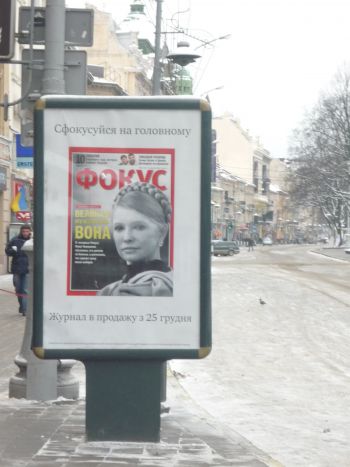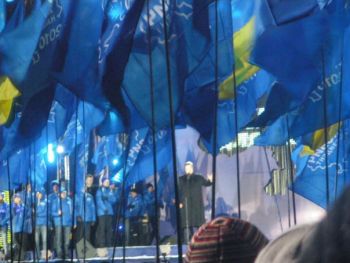The mission concentrated not in the process of voting but instead on the pre-election campaign, impressions of its participants on months of competition, and what a young Ukrainian democracy had to accomplish yet.
Project participants went to candidates’ regional campaign offices, met with representatives of civil society, and directly interviews voters.
“Ukraine moved a long way ahead in terms democracy at elections. The administrative pressure was eliminated as a factor of the pre-election competition. Neither candidates nor voters complained about discrimination and their rights violations from the side of state authorities,” said Anastasiya Matchanka, EOTP project coordinator.
Money war  Nevertheless, certain campaign aspects are in dire need of reconsideration. For instance, there were widespread cases of buying/selling votes, mass media corruption, and a huge income gap between candidates.
Nevertheless, certain campaign aspects are in dire need of reconsideration. For instance, there were widespread cases of buying/selling votes, mass media corruption, and a huge income gap between candidates.
“‘Money war,’ this particular phrase was heard on in numerous times in candidates’ regional offices, especially the less financially well off ones,” said a project participant stationed in Lviv Vadim Vilieta.
The income gap especially was obvious when all the presidential hopefuls had to deposit 2,500,000 hryvnias (more than 200,000 euros) to be able to take part in the election. For comparison, in Lithuania, where a standard of living is noticeably higher than in Ukraine, the analogous deposit is around 3,000 euros. “It appears that in Ukraine on a legislative level politics is defined as a game of the rich,” summed up Vilieta.
Georgians were not welcomed in Odessa
There were some rather amusing incidents. In South and East of Ukraine society cautiously regarded every foreigner, since in these localities the presence of large number of Georgian observers was announced. And a majority of the local population did not welcome them due to pro-Russian sentiments in the region.
In Odessa the project participants had to literary escape the rage of locals, who mistook them for Georgians.
In Kyiv  observers from Lithuania and Belarus tracked down a preparation for ‘a revolution’ in case one of the candidates was to lose the first round. One participant managed to find ‘employment’ for himself by calling a number advertised in the Kyiv subway. He was to be paid 75 hryvnias (around 7 euros) for a day of standing in a crowd on one of the main Kyiv squares. Obviously, the project participant politely declined the offer.
observers from Lithuania and Belarus tracked down a preparation for ‘a revolution’ in case one of the candidates was to lose the first round. One participant managed to find ‘employment’ for himself by calling a number advertised in the Kyiv subway. He was to be paid 75 hryvnias (around 7 euros) for a day of standing in a crowd on one of the main Kyiv squares. Obviously, the project participant politely declined the offer.
Overall the mission was successful and helped to unveil a few inadequacies of the election process. More detailed mission results will be analysed in the final report.
The first round of the presidential election in Ukraine took place on 17 January. Viktor Yanukovych with 35% of votes and Yulia Tymoshenko with 25% advanced into the second round, which is planned on 7 February 2010.
***
The Election Observation: Theory and Practice project (EOTP) was launched in 2007 at the initiative of the students of the European Humanities University (EHU) and Swedish International Liberal Centre (SILC). Today, EOTP is jointly implemented by the United Centre of Initiatives for Belarus (JuBIC), SILC, EHU and Belarusian Human Rights House.
It was designed for young people from Belarus (EHU students and representatives of civil society). Students and activists from Lithuania and Sweden also participate in the project.
The project is financed by Norwegian MFA and Swedish International Liberal Centre. Within its framework several observation mission were already held to Lithuania, Norway, Georgia and now Ukraine. Other missions are planned in countries of the region. Participants not only observe elections but also receive an advanced professional training – an EHU academic course taught by lecturers from Belarus, Lithuania and Norway. To complete the course they have to pass exams. Special diplomas are awarded to those who successfully finish the training.


